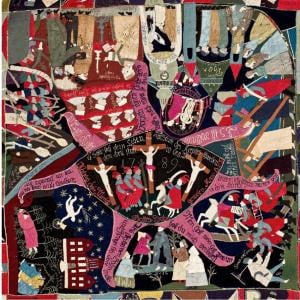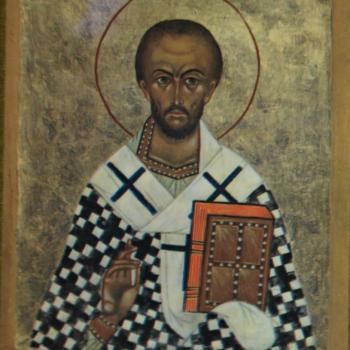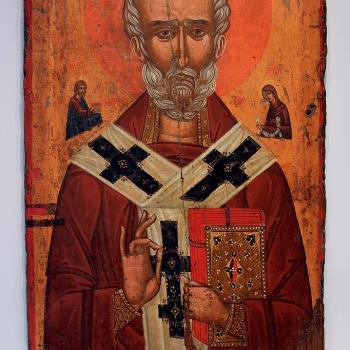
God has been and continues to be at work with all the nations of the earth, each in their own particular way. Some nations have a more central role in salvation history, but all of them have something special God has given to them, something which God intends them to share with everyone else. Each nation has something to contribute for the good of all. Because the incarnation comes to us through the Jews, they have a special, indeed, unique relationship with God, the pivotal one for salvation history, which is why it can be said that salvation is from the Jews. It is why they were given the law of Moses; with it, they received special grace which was used to establish the messianic lineage.
God is not only working with every nation, God gives to them various kinds and levels of revelation, making sure everyone has some insight into the world they live and the kinds of lives they should live. That inspiration not only goes to the various nations, but to every person, so that everyone has a sense of right and wrong, that is, a conscience which they should follow. Everyone is meant to listen to and obey their conscience, and everyone will be judged based upon how well they follow it:
When Gentiles who have not the law do by nature what the law requires, they are a law to themselves, even though they do not have the law. They show that what the law requires is written on their hearts, while their conscience also bears witness and their conflicting thoughts accuse or perhaps excuse them on that day when, according to my gospel, God judges the secrets of men by Christ Jesus (Rom. 2:14-16 RSV).
Different people will have different levels of revelation, different levels of guidance, and so different ways their conscience will direct them. Those who have been given more will have more expected of them, while those who have been given less, will have less expected of them. But all who follow what is given to them will grow, and in their growth, learn and gain more which will then be seeded back to their conscience, giving it a better ability to direct them to doing what is right. Each time they grow, everyone has a chance then to decide if they will continue to follow their conscience, and grow more, or resist it, and either become stuck as they are, or worse, begin to go entirely against its prompting and become corrupted, suffering the consequences of that corruption as they find their personal state of being in decline.
In the end, all who follow their conscience will find God at work in their lives; they will find grace upon grace coming to them, helping them act in accordance to their conscience, and as they do so, they will find be drawn closer and closer to God. They might know they are following God when they do so, but they might not; what is important is that they follow what they perceive to be true and the good, and if they do so, they be following God implicitly if not explicitly, and this is how and why God will be able to work with them and save them, even if they do not know or believe in God. This is one of the points we are to get from Jesus when he talked about the last judgment. He is God, and many will be following him, doing good in and with him, not knowing they are doing so, and only in hindsight will they understand they have been walking with him all their lives.
Thus God calls everyone, Jew and Gentile alike, each in their own way; salvation history is the history of the world and the various relationships that people as persons and nations have with God. The first part of salvation history is found in the preparation of the world for the messiah, for the incarnation, so that when he came, he could be seen as fulfilling the expectations that all nations had (and not just the Jews). The second part of salvation history deals with what happens after the incarnation, after the life, death, resurrection, and ascension of Christ, where the world now can be said to be preparing for him to come once again at the end of time:
As I have already indicated, many, not only from among the Jews but also from the Gentiles, had foreknown the coming of Christ and were waiting for it with great desiring, according to the prophet, Behold the one desired of all the nations shall come. He does not say, “the one going to be desired,” but “the one desired,” so you might understand that in all the nations some people at certain times burned with desire for him. Therefore, his coming was known beforehand and greatly desired by many from the nations. They came to this knowledge gradually over a period of time and they ascended step by step by progressive degrees. [1]
Christ will come again to unite humanity, to bring it together as one, so that everyone will be united with each other, not in some sort of monistic absorption, but in an integral unity where each person is connected with everyone else by a bond of love. This is something which Theodoret understood could be seen reflected in Abraham; Theodoret said in Abraham we find Jews and Gentiles are already one. This is why Abraham can be said to be the forerunner of the faith, and as a forerunner of the faith, he demonstrated the radical faith which Jews and Gentiles alike should imitate:
I mean, the God of all, foreknowing as god both that he would gather together one people from Gentiles and Jews and through faith would provide them with salvation, foreshadowed both in the patriarch Abraham; after showing him in possession of righteousness through faith before circumcision, and after circumcision not living according to the Mosaic Law but abiding by the guidance of faith, he gave him the name of father of the nations so that both Jews and Greeks should fix their eyes on him, not the former on his circumcision and the latter on his uncircumcision, but both imitating his faith.[2]
Since we have been born in the world after the incarnation, that is, in the second era of salvation history, we find ourselves called by Christ where we are at, to come and follow after him, and to serve him in the world as it is being prepared for his second coming. We are called to come to know ourselves in Christ, becoming truly who we are, just as Peter and Andrew found their true selves in Christ as they went from being fisher men to fishers of men and women for Christ:
As he walked by the Sea of Galilee, he saw two brothers, Simon who is called Peter and Andrew his brother, casting a net into the sea; for they were fishermen. And he said to them, “Follow me, and I will make you fishers of men.” Immediately they left their nets and followed him (Matt. 4:18-20 RSV).
Let us pay attention to our conscience, where Christ is at work in and with us, calling us to follow him. Let us become who we were meant to be in him by living out the vocation we have been given, the way of life we have been given which is unique for us, doing so in as just and righteous a manner as possible. For this is how we will find our perfection, just as Peter and Andrew found theirs.
[1] Richard of St. Victor, “On Isaiah,” in Interpretation of Scripture: Practice. Trans. Huh Feiss, OSB and Dale Coulter. Ed. Frans van Leiere and Franklin T. Harkins (Turnhout, Belgium: Brepols, 2015), 237.
[2] Theodoret of Cyrus, Commentary on the Letters of St. Paul. Volume One. Trans. Robert Charles Hill (Brookline, MA: Holy Cross Orthodox Press, 2001), 67[Romans].
Stay in touch! Like A Little Bit of Nothing on Facebook.
If you liked what you read, please consider sharing it with your friends and family!
N.B.: While I read comments to moderate them, I rarely respond to them. If I don’t respond to your comment directly, don’t assume I am unthankful for it. I appreciate it. But I want readers to feel free to ask questions, and hopefully, dialogue with each other. I have shared what I wanted to say, though some responses will get a brief reply by me, or, if I find it interesting and something I can engage fully, as the foundation for another post. I have had many posts inspired or improved upon thanks to my readers.












